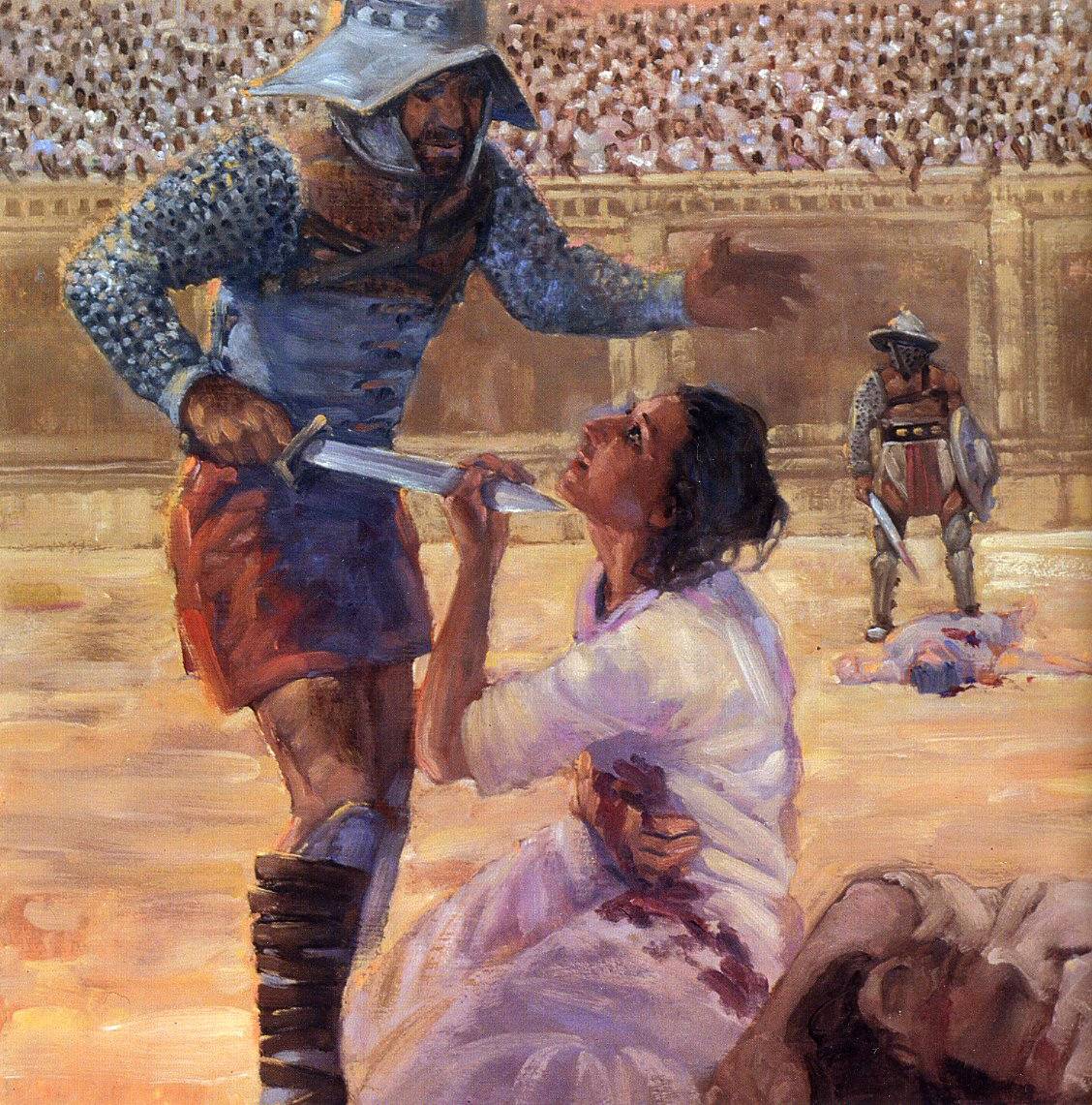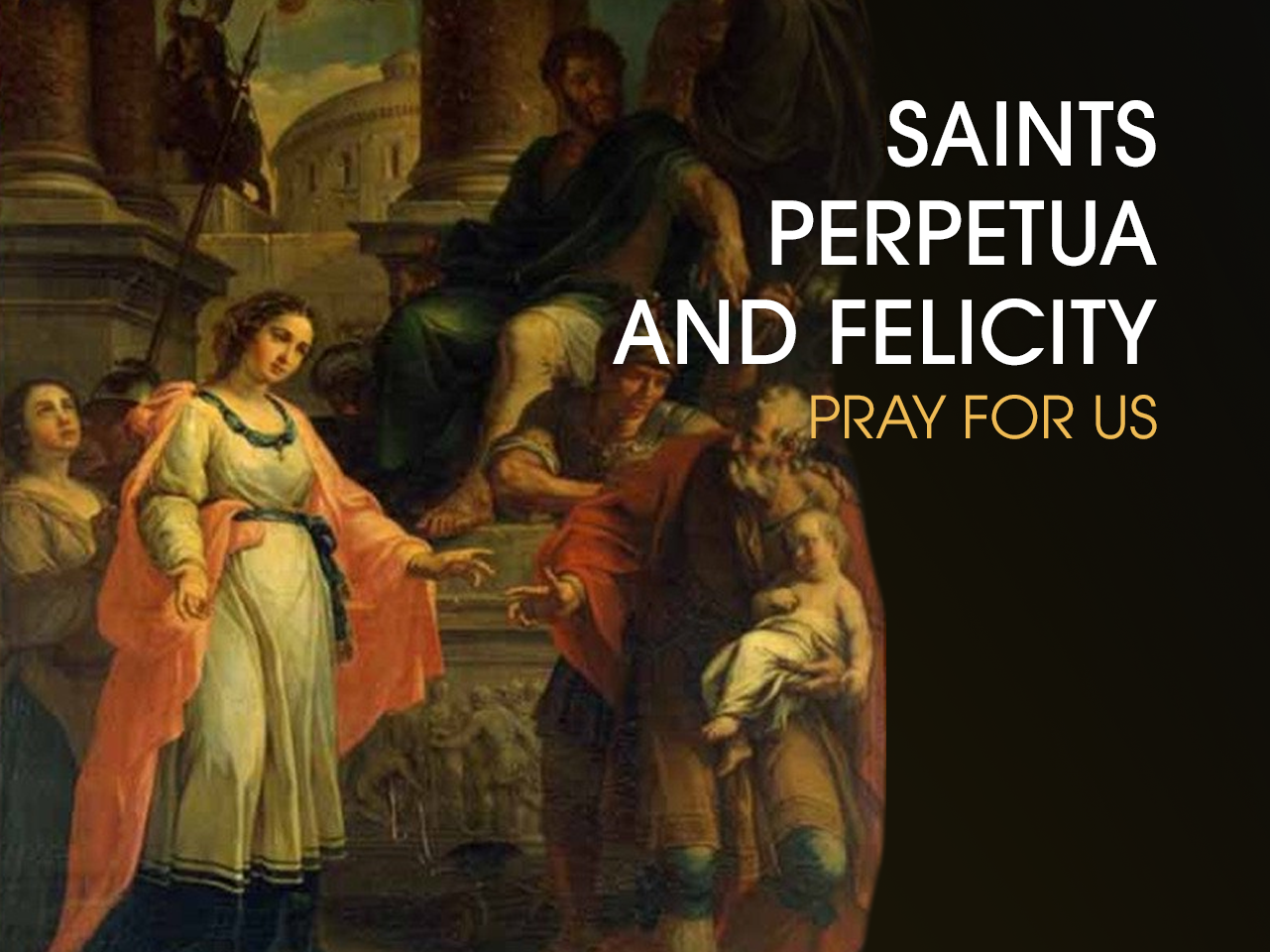It’s long, but it’s Lent. I LOOOVE strong women; and in my life, have been so impressed with the majority of the opposite sex I have encountered, I, conservative in many other respects, consider myself a moderate feminist. Women, I believe, are the backbone of civilization, and have been and continue to be its salvation on many occasions, and certainly instrumental to the Lord and His Work, then and now, as scripture and our own experience clearly tells us.
No saints were more universally honored in the early Church than Perpetua & Felicity. They are honored to this day by Christians, partly due to the fact that the account of their martyrdom is so precise. We know the details of Perpetua’s and Felicity’s imprisonment because Perpetua kept a diary which is contained in the Vatican archives to this day.
Vivia Perpetua (“life eternal”) was a noblewoman in the North African city of Carthage, in modern Tunisia. She was the 22 year old wife of a man in a good position in the city and the mother of an infant boy. She, her mother and two brothers were all Christians, but her father was a pagan.
Felicity (“happiness/bliss”) was a slavewoman who accepted Christianity. When she was imprisoned she was an expectant mother. We don’t know as much about her as we do about Perpetua and only what was in Perpetua’s diary.
Perpetua and Felicity were among a group of five Christians rounded up in Carthage on the orders of the Emperor, Septimius Severus. The others were two free men, Saturnius and Secundulus, and a slave, Revocatus. They were later joined by another man, Saturus, who was apparently their instructor in the faith, their catechist, and who chose to share their punishment. At first they were lodged in a private house under heavy guard, but later were moved to a prison.
Perpetua wrote in her diary that her father tried to save her life by urging her to renounce Christianity. “I said to my father, ‘Do you see this vessel – water pot or whatever it may be? Can it be called by any other name than what it is?’ ‘No,’ he replied. ‘So also I cannot call myself by any other name than what I am – a Christian.’ Then my father, provoked by the word ‘Christian,’ threw himself on me as if he would pluck out my eyes, but he only shook me, and in fact was vanquished…Then I thanked God for the relief of being, for a few days, parted from my father.”
During her imprisonment, Perpetua’s greatest concern was for her baby. She wrote: “A few days later we were lodged in the prison, and I was much frightened, because I had never known such darkness. What a day of horror! Terrible heat, owing to the crowds (imprisoned with us)! Rough treatment by the soldiers! To crown all I was tormented with anxiety for my baby. But Tertius and Pomponius, those blessed deacons, who ministered to us, paid for us (by bribing the guards) to be moved for a few hours to a better part of the prison and we obtained some relief.”
Then Perpetua said her baby was brought to her and she nursed it, “for already he was faint for want of food.” She wrote that she spoke to her mother about her baby and commended her son to her and to her brother. “For many days I suffered such anxieties, but I obtained leave for my child to remain in prison with me, and when relieved of my trouble and distress for him, I quickly recovered my health. My prison suddenly became a palace to me and I would rather have been there than anywhere else.”
By this time Perpetua and her fellow prisoners were determined that they would suffer death before they would renounce their faith. However, Perpetua’s father did not give up his attempts to save her life. “Daughter,” he said, “pity my white hairs! Pity your father, if I deserve you should call me father, if I have loved you more than your brothers! Make me not a reproach to mankind! Look on your mother and your mother’s sister, look on your son who cannot live after you are gone. Forget your pride; do not make us all wretched! None of us will ever speak freely again if calamity strikes you.” Perpetua wrote in her diary in response,”He alone of all my kindred would not have joy at my martyrdom.”
The next day, Perpetua’s trial began at the forum in Carthage. The prisoners were placed on a platform. The judge was Hilarion, procurator of the province. The others were questioned first and all confessed their faith.
When it was Perpetua’s turn, her father suddenly appeared with her infant son. He implored his daughter to “have pity on the child.” Then Hilarion joined with her father and said, “Spare your father’s white hairs. Spare the tender years of your child. Offer sacrifice for the prosperity of the emperor.”
Perpetua replied, “No!”
Hilarion asked, “Are you a Christian?”
Pepetua answered him, “Yes, I am.”
At that her father ran up on the platform and tried to drag her down the steps, but Hilarion gave the order that he should be beaten off. One of the guards struck him with a rod.
Perpetua said, “I felt as much as if I myself had been struck, so deeply did I grieve to see my father treated thus in his old age.”
Hilarion then passed sentence, condemning them to the wild beasts. He had Saturus, Saturninus and Revocatus scourged (Secundulus seems to have died in prison before the trial), and Perpetua and Felicity beaten on the face.
Hilarion then ordered that they be kept for the gladitorial shows which were to be given for the soldiers on the birthday festival of Geta, the young prince and son of the Emperor. The prisoners returned to their cells, rejoicing.
The attitude of the prisoners resulted in many conversions. One of them was their jailer, Pudens, who did everything he could for them. The day before the games, they were given the usual last meal, which the prisoners tried to make an “agape”(Greek for love, used by Christians to denote Christian love, in contrast to “eros””ἔρως”, or “philia””φιλία”) meal, or Eucharistic meal. They sang psalms, prayed and spoke to those around them of the judgments of God and of their own joy in their sufferings. (Acts 5:41-42)
On the day of their martyrdom, they marched from their cells to the amphitheater with cheerful looks and graceful bearing. The three men walked ahead and Perpetua and Felicity followed them, walking side by side, the noblewoman and the slave. At the gates of the amphitheater the attendants tried to force the men to put on the robes of the priests of Saturn and the women the dress symbolic of the goddess Ceres, but they all resisted and the officer allowed them to enter the arena clad as they were.
As they entered the arena, Perpetua was singing. The three men called out warnings of the coming vengeance of God to the bystanders and to Hilarion, as they walked beneath his balcony.
Perpetua was the first to be attacked. When she looked up, she saw Felicity on the ground and reached out her hand to lift her up. Both stood up, and were then ordered to the gate called Sanavaria (where those not killed by the beasts were executed by the gladiators). There Perpetua was welcomed by a catechumen called Rusticus. Perpetua, rousing herself as if from sleep (she had been deeply in spiritual ecstasy), began to look around. To everyone’s amazement, she said: ‘When are we going to be led to the beasts?’ When she heard that it had already happened, she at first did not believe it until she saw the marks of violence on her body and clothing.
Then she beckoned to her brother and the catechumen, and addressed them in these words: ‘Stand firm in faith, love one another and do not be tempted to do anything wrong because of our suffering.’
Saturus, too, in another gate, encouraged the soldier Pudens, saying: “Here I am, and just as I thought and foretold I have not yet felt any wild beast. Now believe with your whole heart…Right at the end of the games, when Saturus was thrown to the leopard, he was in fact covered with so much blood from one bite, that the crowd in the amphitheater cried out to him, “Washed and saved! Washed and saved!” Then Saturus said to Pudens, “Farewell, and remember your faith as well as me; do not let these things frighten you; let them rather strengthen you.” At that moment, Saturus asked Pudens for the ring from Pudens’ finger. Soaking it in his wound, he returned it Pudens as a remembrance and a keepsake.
The mortally wounded martyrs were led to the middle of the amphitheater to end their suffering and receive the death blow from the gladiators. They gave each other the kiss of peace. The gladiator ordered to kill Perpetua was young and inexperienced. Perpetua steadied his shaking hand and guided his sword to her throat.
Before such a woman, the unclean spirit trembles.
“Neither can I call myself anything else than what I am, a Christian.”
—St. Perpetua
Prayer to Sts Perpetua & Felicity
Father, Your love gave the Saints Perpetua and Felicity
courage to suffer a cruel martyrdom.
By their prayers, help us to grow in love of You.
We ask this through our Lord Jesus Christ, your Son,
Who lives and reigns with You and the Holy Spirit,
one God, forever and ever. Amen.
Love,
Matthew


